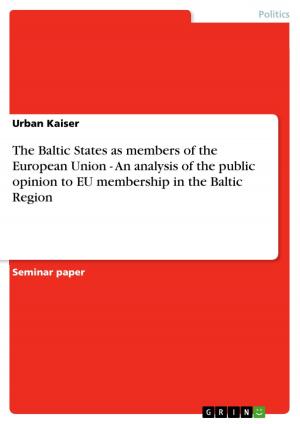Towards the Citizen? Legal Integration in the European Union
Nonfiction, Social & Cultural Studies, Political Science| Author: | Hannah Cosse | ISBN: | 9783638625159 |
| Publisher: | GRIN Publishing | Publication: | March 16, 2007 |
| Imprint: | GRIN Publishing | Language: | English |
| Author: | Hannah Cosse |
| ISBN: | 9783638625159 |
| Publisher: | GRIN Publishing |
| Publication: | March 16, 2007 |
| Imprint: | GRIN Publishing |
| Language: | English |
Seminar paper from the year 2006 in the subject Politics - International Politics - Topic: European Union, grade: 2.0, University of Twente (School of Management and Governance), course: European Union Law, 13 entries in the bibliography, language: English, abstract: The integration process of the European Union has transformed the economical cooperation of the European Coal and Steel Community (ECSC) into a somehow political entity. Starting with the ECSC in 1951, the Single European Market (SEM) was completed by the introduction of the common currency´in 2002. However, besides an economic integration, also political integration made progress - especially since the establishment of the European Union by the Maastricht Treaty (TEU) in 1992. Both different perspectives of integration were accompanied by a concise legal integration. The competences of community law have exceeded tremendously. The future of the integration process is unknown and non-predictable. However a trade-off between deepening integration and widening enlargement is the future challenge of the EU. It is commonly agreed that ongoing integration needs a higher 'connectedness' of the European Union and the Europeans. Since the 1980s the debate about how to include the Europeans a bit more in the integration process gained influence. In the 1980s the first steps were made by setting up a social charter that was mainly concerned with the rights of workers. Also the creation of the status of citizenship by the TEU in 1992 was intended to support the common market. Additionally the European Community gained new and broadened its competences in social policies. Both areas - citizenship and social policies - are directly related to the Europeans. The concept of citizenship and also the reach of European Social Policies are arguable from a variety of starting points. Questions about identity and welfare states in general might occur. A different perspective is the legal one. Of course the effectiveness of politics cannot only be measured by the amount of law produced, but without legal consequences policy outcomes or outputs are kind of worthless. So, the core of this paper shall elaborate not on political dimensions connected to the Europeans, but on legal ones. At a first sight the formal introduction of citizenship and the inclusion of social policies in the EC Treaty might look impressive, but what they actually mean will be analysed in this paper. Especially if they might be able to connect the EU a little bit more to its citizens.
Seminar paper from the year 2006 in the subject Politics - International Politics - Topic: European Union, grade: 2.0, University of Twente (School of Management and Governance), course: European Union Law, 13 entries in the bibliography, language: English, abstract: The integration process of the European Union has transformed the economical cooperation of the European Coal and Steel Community (ECSC) into a somehow political entity. Starting with the ECSC in 1951, the Single European Market (SEM) was completed by the introduction of the common currency´in 2002. However, besides an economic integration, also political integration made progress - especially since the establishment of the European Union by the Maastricht Treaty (TEU) in 1992. Both different perspectives of integration were accompanied by a concise legal integration. The competences of community law have exceeded tremendously. The future of the integration process is unknown and non-predictable. However a trade-off between deepening integration and widening enlargement is the future challenge of the EU. It is commonly agreed that ongoing integration needs a higher 'connectedness' of the European Union and the Europeans. Since the 1980s the debate about how to include the Europeans a bit more in the integration process gained influence. In the 1980s the first steps were made by setting up a social charter that was mainly concerned with the rights of workers. Also the creation of the status of citizenship by the TEU in 1992 was intended to support the common market. Additionally the European Community gained new and broadened its competences in social policies. Both areas - citizenship and social policies - are directly related to the Europeans. The concept of citizenship and also the reach of European Social Policies are arguable from a variety of starting points. Questions about identity and welfare states in general might occur. A different perspective is the legal one. Of course the effectiveness of politics cannot only be measured by the amount of law produced, but without legal consequences policy outcomes or outputs are kind of worthless. So, the core of this paper shall elaborate not on political dimensions connected to the Europeans, but on legal ones. At a first sight the formal introduction of citizenship and the inclusion of social policies in the EC Treaty might look impressive, but what they actually mean will be analysed in this paper. Especially if they might be able to connect the EU a little bit more to its citizens.















